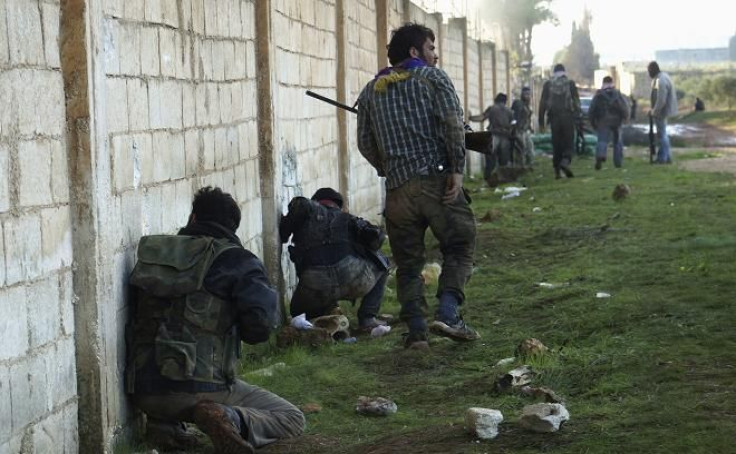Syrian Crisis: Hundreds Dead In Massacre Outside Homs, UN Predicts 100,000 More Killed In 2013

It may not have been with gas or mustard gas, but between 150 and 180 people were massacred outside Homs, Syria, over the weekend by government forces in the single bloodiest day in the civil war to date, the Washington Post reported on Sunday. The total death toll for the weekend stood at 400, including 23 children, according to the U.K.-based Syrian Observatory for Human Rights.
The Syrian Network for Human Rights reported that 107 more people were killed by Syrian security forces on Monday. Estimates for the total numbers dead are now more than 45,000, and Lakhdar Brahimi, the U.N. and Arab League's Joint Special Envoy, says he expects 100,000 more people to die in 2013.
"I am unable to see another solution out of two possibilities," Brahimi told reporters in Cairo on Sunday. "Either a political solution that is accepted by the Syrian people which meets its aspirations and legitimate rights, or Syria to be transformed into hell."
Rumors of chemical use against civilians are circulating -- on Saturday Israeli journalist Ron Ben-Yishai alleged that the regime of Bashar al-Assad had already been using chemical agents, if not chemical weapons, for a few months now. Thus far six people have died from chemical exposure.
In a Washington Post opinion piece on Sunday, U.S. Senators John McCain, Joe Lieberman and Lindsey Graham took U.S. President Barack Obama to task for not acting more swiftly and decisively on the Syrian issue, and indeed, for failing to intercede at all.
"If we remain on the current course, future historians are likely to record the slaughter of innocent Syrians, and the resulting harm done to America’s national interests and moral standing, as a shameful failure of U.S. leadership and one of the darker chapters in our history," the senators wrote. "That should unsettle us all as we pray for peace and goodwill this holiday season."
But Ben-Yishai countered that there cannot and will not be any military operation against the Syrian regime while Assad still controls the main arms caches or chemical weapons sites.
"Assad, who is aware of this, wants to avoid any act that will lead to international military intervention in Syria," Ben-Yishai wrote. "However, his army is fighting the rebels with brutal determination and is using all the means at its disposal," including using Scud missiles and other heavy artillery on known civilian centers.
"The situation in Syria is bad, very, very bad, and it is getting worse and the pace of deterioration is increasing," Brahimi said. “World peace and security will remain under direct threat from Syria if the problem is not solved in the few coming months."
Brahimi also refused to accept the idea that Syria could be split into several countries, instead suggesting that if a political solution is not found, "Somalization" would occur with various warlords taking over and vying for power.
The Syrian Prime Minister under Assad, Wael al-Halaqi, told al-Arabiya that the Assad government is willing to settle the conflict through talks. “The government is working to support the national reconciliation project and will respond to any regional or international initiative that would solve the current crisis through dialogue and peaceful means and prevent foreign intervention in Syria’s internal affairs,” he said.
Brahimi didn't seem convinced. "The problem is that both sides are not speaking to one another, [they] are speaking across … one another," Brahimi said in Cairo.
Brahimi arrived in Cairo from Moscow, where he had been meeting with Russian Foreign Minister Sergey Lavrov after meeting with Assad in Damascus. He said that in Moscow he discussed the possibility of future Syrian elections.
"I think that Syrians won't like a presidential regime in the future, like the one they have during the last 40 years,” Brahimi said. “In such case, a parliament and a government will be elected, and Syria will start healing its wounds and, God-willing, the regional and international communities will help Syrians resolve their problems and rebuild their country.”
Russia continues to deny that it is either aiding the regime, or making the bed for Assad if he should decide to flee and seek sanctuary, despite the repeated presence of Syrian envoys in Moscow in the past month.
"We aren't providing the Syrian regime with any offensive weapons or weapons that could be used in a civil war," Lavrov told the AP on Saturday. "We have no leverage over what the regime has got since the Soviet times."
Lavrov said that Assad has "repeatedly said publicly and privately, including in his meeting with Lakhdar Brahimi … that he does not intend to leave for anywhere, that he will stay to the end in his post, that he will, as he expressed it, defend the Syrian people, Syrian sovereignty and so forth. There's no possibility to change this position."
© Copyright IBTimes 2024. All rights reserved.












